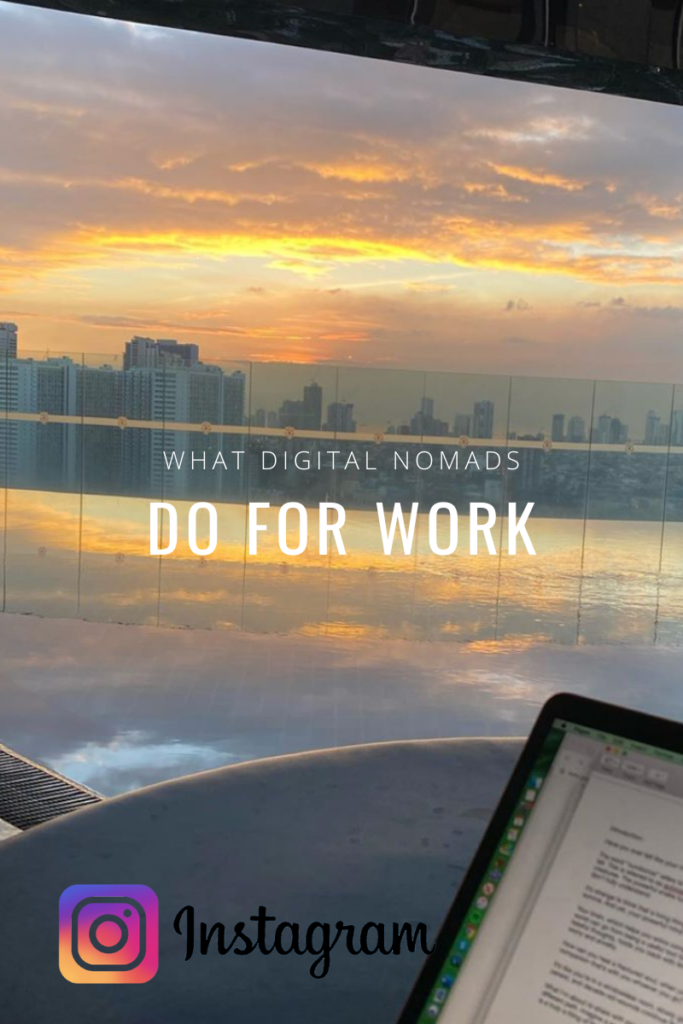Becoming a digital nomad used to be a pipe dream, now people are doing it at record rates.
Research shows that there are 4.8 million digital nomads worldwide, and that trend is only growing. Location independent entrepreneurs and workers are traveling the globe, working from their laptop, and taking some pretty cool Instagram pics while doing it.
It’s no longer some kind of “make money online” scheme that it used to be. There is a practical and proven path for achieving location independence in a matter of months. There is a cottage industry of websites, resources, and experts to show you how. You even have killer resources like this site which will show you some of the best digital nomad cities in the world.
Whether you want to travel and see the world, are tired of working from a corporate cubical, or you just want to explore an alternative career path, there’s nothing stoping you from claiming your freedom!
In this article, I want to go through what digital nomads actually do for work. We’ll cover some of the pros and cons of location independent jobs, along with what you should know if you wanna take the leap.
This is the gateway to a lifestyle of freedom, independence, and flexibility. Let’s make sure you don’t sacrifice your paycheck or your savings while you’re trying to get there.
This time next year, you’ll be chilling on a beach in Thailand, or looking at a majestic sunset in the Philippines.
Let’s get into it!
8 Common Things Digital Nomads Do For Work
MBO Partners did a great report on “Digital Nomadism” where they studied and surveyed the working population. According to their findings, 54% of nomads are full-timers and 46% are part-time workers.
These are some of the important findings:
- About 38% earn less than $10,000 per year.
- About 16% earn $75,000 per year or more (this is 790,000 people).
- About 31% are female and 54% are older than 38 years old.
This means that there is ample opportunity to earn money from your laptop. The only question is… how much money. This survey leaves out the most common places that nomads live, but often, it is in countries that offer an affordable cost of living.
Location independent workers will take advantage of what’s called cost arbitrage. They will be earning money in their home country’s currency, while spending money in their local currency.
Think of this as earning a New York City level salary, but being able to live in a rural place like Mississippi, where the median household income is $43,441. In other words, your dollar goes a lot farther overseas than at home. Because of this simple fact, nomads don’t have to earn as much money as when they’re living in their home country.
Let’s get into some of the common fields for a location independent career.
1. Writers, Editors, and Content Creators
It’s no surprise that writers, editors, and online content creators make up a bulk of the jobs. All you really need to perform this kind of work is your laptop, an internet connection, and a client who values your work.
This is one of the reasons why so many bloggers become digital nomads. It’s an easy transition if you already have some traffic and are monetizing it the right way. In addition, you can diversify your passive income by doing things like freelance writing for other businesses and blogs.
Writing content online takes the form of what’s called “content marketing,” where you’re helping a company develop educational materials for prospective clients. Those materials could be things like blog posts, but also be white papers, ebooks, guides, infographics, and more.
2. Designers, Artists, and Creative Types
Working with a variety of clients, Designers are also a common career path for digital nomads. They can work remotely, only needing the right software to get the job done. This lends great to working on the go, or if they need a more quiet place, they can always join a coworking space.
While freelancers make up the bulk of this career path, designers and artists can also earn passive income through the creation of website themes, royalty-free images, and other designs that can be sold on websites like ThemeForest.
3. IT Professionals (Programmers, Developers, etc)
If you have coding skills, or the ability to help develop valuable projects like apps, websites, and other tools, then your work will lend very well to the digital nomad lifestyle. You can work remotely with a team of individuals from a coworking space.
Good programmers are in such high demand that they rarely have trouble finding work. This gives them more choice and flexibility when it comes to where they want to work. Their existing company may even be willing to keep them on and allow them to work remotely.
4. Marketing and Online Communication
Social media marketing is booming! Every company now needs a social media presence, only most business owners don’t have a clue as to what they’re doing. They need help, and you can be there to hold their hand.
As a marketing professional, you’ll need to learn a bit about organic marketing, paid marketing, and how to use social media tools, but once you do, this field is ripe for opportunity. You can become a valuable asset in a business by helping them to get traffic and convert that traffic into customers.
5. Ecommerce
Now a days with powerful business models like white labeling and dropshipping, it’s easier than ever before to earn an income by selling products online through Amazon or your own website. You can also design and create your own product. You can even use crowdfunding to raise money for it!
The ecommerce industry is only going to grow in the next couple of years, and if you have a handle on the right product to sell, how to get traffic, and how to figure out your supply chain, you can easily operate your business while you’re traveling the world.
6. Teaching Online
What I LOVE about teaching is that it can be combined with many of the above skillsets. For example, if you are a great writer, then you can also teach other people how to write. If you are a good designer, you can teach other designers how to design.
While it will require some upfront effort, teaching can be an incredibly effective way to begin to develop a new revenue stream for your business. It’s also incredibly rewarding. You’ll need to master a few basic things like marketing, video creation, and how to sell your courses, but once you do, it’s off to the races!
7. Podcasters
A few years ago, I wouldn’t have included Podcasting in this list, but in my recent travels abroad, I’ve met more and more nomads who are also podcasters. There is a good reason too!
Podcasting is confined to audio, so you don’t have to worry as much about wifi uploading speeds, or deal with the intensive editing that goes into video creation. You can record a show from anywhere, schedule it to go out at a later time, and just like with blogging, it’s seeing a big surge in growth. Starting a podcast is a great way to get started building an audience online.
8. Online Video Work
Video editing can be done anywhere. I have editors who help me from around the world come out with new YouTube videos for my channel. As long as they get the job done, it doesn’t matter to me what their location is.
You can start a career as a video editor for commercials, educational videos, explainer vids, or you can start your own YouTube channel and begin to build your brand. It’s not that hard to earn some extra income doing just that. I documented my own journey growing my revenue from that platform.
Like with blogging or podcasting, you can also combine this with other forms of income-creation like affiliate marketing, online courses, books, etc. Now that we’ve gotten into some of the skills you can use, let’s talk a bit about the actual career path.
You’re an adult. You’re not looking to make a little extra cash here and there. You’re looking for a real, sustainable, career path with potential for growth. Right?
Let’s get into what this career path could look for the average person, even if you don’t have any skills, experience, or previous history in the online world. Remember, a good chunk of nomads are actually over the age of 38!
The Digital Nomad Career Path – 5 Simple Steps
The question is simple.
How do you want to earn income.
Do you want to trade time for money?
Do you want to earn passive income?
Do you want to work for someone else or be your own boss?
1. Pick One… Employee or a Business Owner
As an employee, you could negotiate with your existing employer to see if they would be willing to let you work remotely for your full-time job. If not, they might be willing to keep you on for some part-time work if you’re good at what you do. This can really help to supplement your income stream as you’re searching for more work.
Freelancers also fall into the category of employee. Rather than having one boss, they have multiple. They are selling their time for money and working from project to project. Becoming a freelancer is the easiest transition if you’re not very familiar with online work. You can go on websites like Upwork to get started.
As a business owner, the type of business you choose will determine your viability for location independence. For example, owning a retail outlet in your city isn’t going to give you any kind of flexibility. Actually, it’s more like a form of handcuffs.
Personally, I started my career as a blogger, transitioned into podcasting, and then into YouTube. I also sell books, digital courses, and do online coaching. My type of business is an “expert style” business, where I’m monetizing my skillset in a few different ways. There are lots and lots of business ideas out there you can look into.
2. Find a Good Training Program
I know, I know. Online training might seem “scammy” or it’s weird do do something like take an online course. Right?
Well… take a step back. Anytime you were serious about a career path in life, chances are, you got a little bit educated about it. Maybe you went to college, so that you could earn more money at your job. Maybe you got an MBA so you could understand business and make more money.
You could spend a little bit of time hunting around on YouTube or poking around on Google, but it will REALLY help if you enroll in a dedicated step-by-step program that shows you exactly how to become a digital nomad. There are some good ones out there. I also have an affordable and comprehensive course that you can check out here.
If you don’t check out my own course, make sure that the one you enroll in covers a few things, including:
- Tax implications and regulations you should be aware of
- The best and fastest ways to generate income
- The top digital nomad hubs and locations around the world
- Dealing with emotional issues like loneliness and fear
A good program should not only prep you for the lifestyle and the ways you can earn income, but also go through some of the great locations out there and cover some of the negative sides of the lifestyle, like loneliness.
3. Gather Proof, Promises, and Results
If you do NOTHING else as regarding the marketing of your personal brand, then at least develop proof, promises and results. As an employee, you likely had a resume. When it comes to online work, your resume doesn’t matter as much. What’s more important is the projects you’ve worked on.
- Proof: What proof do you have you did a good job in the past? Do you have testimonials? Awards? Media mentions?
- Promises: What can you do for other people? Example: “I write an epic in-depth blog post to catch the eye of potentially lucrative customers.”
- Results: From a quantitative perspective, what have you done for others. Example: “I wrote blog posts that drove 50k unique visitors to my client’s blog over the course of a year.”
This is a very simple and doable format for getting clients or customers. The more that you work on your “case file,” or the real reason why someone should give you money, then the sooner you’ll start to make it.
I call this stacking ammo. Filling the war chest. This is valuable stuff, and your time gathering it is well spent.
4. Decide On Your TMI – Target Monthly Income
NO – This is NOT the same as your salary.
I explain why in my Digital Nomad Course, but basically, there are many factors that go into your existing salary that your employer is paying.
As a nomad, you have to think about things like health care, taxes, standard of living differences, and travel costs. Your target monthly income may be lower or higher than what you anticipate. It all depends on the lifestyle you wanna have.
Your TMI will guide the choices you make going forward. Some people might say “well, I wanna make as much as possible.” Realistically, you don’t.
Here’s why.
In order to make as much money as possible, you have to be WORKING as many hours as possible.
Everyone wants to earn six or seven figures, but no one wants to work 80 hour weeks and give up having fun as you travel. I did this for the first 2 months of my last travel experience, and boy oh boy, it sucked.
I was much happier when I had a stable balance of both work and fun. I talk a little bit about that in this video here.
5. Do This Before You Take The Leap
I strongly recommend that you do something before you become a full-time digital nomad and travel the world for the next 4 years.
I’d recommend that you do a mini-nomad experience, where you travel for a defined length of time, like 2 months, and see how it goes.
Not everyone enjoys the digital nomad lifestyle. I did my first “four hour work week” experience in Thailand when I was 23. I documented it on this blog. I also documented some of my not so great experience from working too much in NYC.
Before you really take the leap, I’d do a trial run. Even if that’s just a month of travel. Traveling for a month is way different than going on a simple 1 or 2 week vacation. You’ll learn a tremendous about yourself.
I hope you found this post to be helpful, and if you do, consider reaching out to me with any questions!


